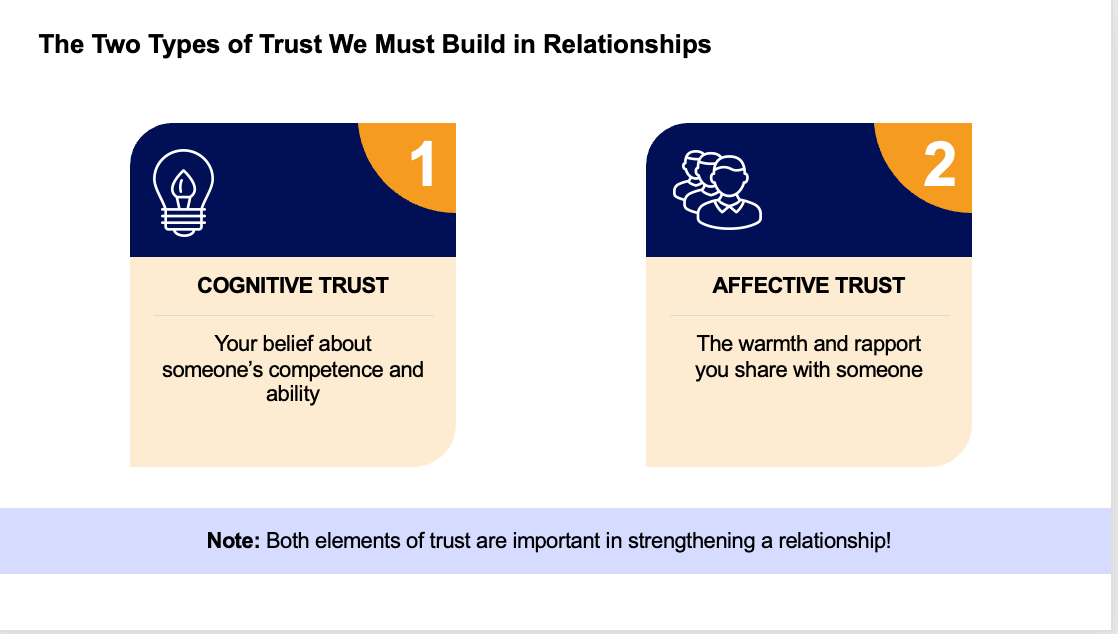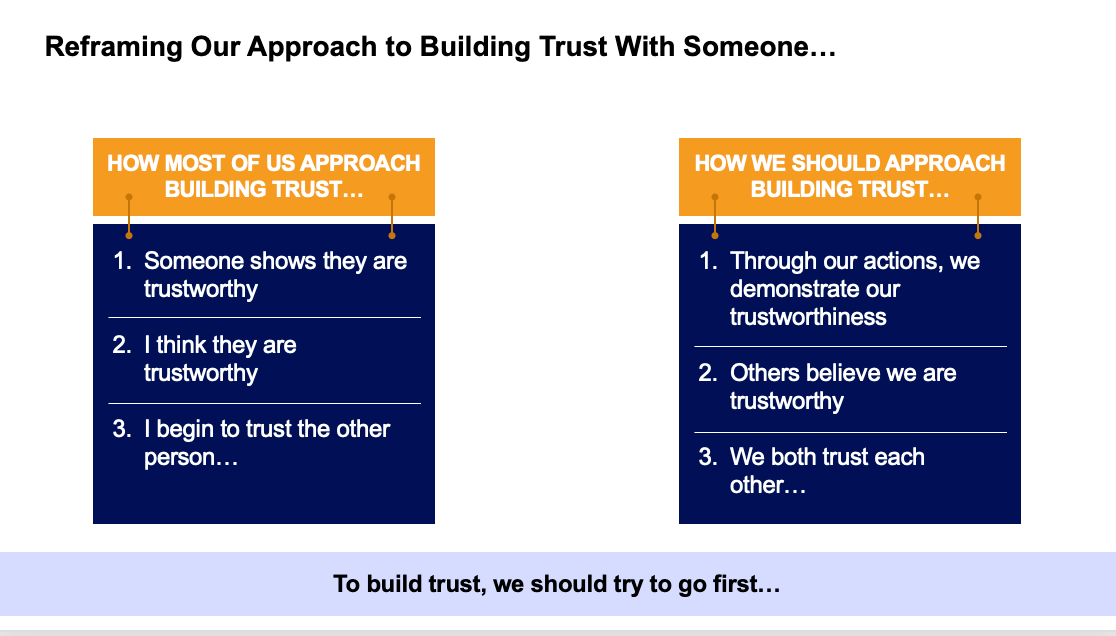In every organization, no matter the size, industry, or mission, success ultimately comes down to people. People working with people. And the glue that holds all of those collaborative efforts together? Trust.
Whether you’re managing a team, leading a project, or trying to get buy-in from a peer or senior leader, your ability to build strong, trusted relationships is often what separates good outcomes from great ones. But here’s the thing: trust doesn’t magically happen. It must be earned intentionally, thoughtfully, and consistently.
Why Trust Matters In Work Today
Organizations today are more complex than ever. Matrixed teams, cross-functional projects, hybrid work environments, and ever-shifting priorities mean we rely more and more on others to get our work done. You can’t accomplish your goals alone, and neither can anyone else.
Yet in that interdependence lies a challenge: we all have some discretion about who we choose to collaborate with, support, or go the extra mile for. And human nature tells us we’re more likely to do that for people we trust.
We do business with people we know, like, and trust. (emphasis on the final word, trust..) So, if you want to become more effective in your role, earn more influence, and foster stronger working relationships, you must learn to build and sustain trust on purpose.
What Trust Really Means
The textbook definition of trust is “a firm belief in the reliability, truth, ability, or strength of someone or something.” That’s a solid starting point, but it doesn’t tell the whole story.
There are actually two kinds of trust:
Cognitive Trust: This is trust based on someone’s skills, competence, and ability to deliver.
Affective Trust: This is trust based on warmth, connection, and how you feel when you’re around someone.
Most people focus on cognitive trust. We show that we’re smart, reliable, and that we get things done. That’s important. But affective trust often gets overlooked. It’s harder to measure, but just as important. Think about that one colleague you’ll always help out, simply because they’re great to work with. That’s affective trust in action.
Both kinds of trust matter. We’ve all worked with someone who’s brilliant, but difficult to work with. Or someone who’s friendly, but not dependable. It’s when both cognitive and affective trust come together that relationships really thrive.
Flip the Script on Trust
A lot of people think about trust like this: “Once someone proves to me that I can trust them, then I’ll trust them.” But if we want to be more intentional about building relationships and moving work forward, we’ve got to flip that.
Instead, try this:
I show others, through my actions that I’m trustworthy.
They begin to believe that I’m trustworthy.
We start to trust each other more and more over time.
Trust grows with contact. It builds with every small, consistent action. It’s something we earn over time, not something we’re automatically given.
Think About Trust Like a Bank Account
One way to think about trust is like a bank account. You can’t make a withdrawal if you haven’t made any deposits. Same goes for trust. If you haven’t consistently invested in building a relationship, it’s going to be really hard to ask for help, share a tough piece of feedback, or get support when you need it.
The question then becomes, how do you make those deposits?
Four Simple Ways to Intentionally Earn Trust
Trust is a contact sport that increases over time and through consistency. Here are four specific actions you can take in your day-to-day work to build trust with teammates, peers, and stakeholders. These don’t require big changes or a lot of time. Just consistent effort and intention.
1. Five-Minute Favors
This one comes from organizational psychologist Adam Grant. A five-minute favor is a small act of kindness that takes little time on your part but means a lot to someone else.
For example, I host a podcast, and I always leave reviews for other shows I enjoy. It takes me a couple minutes, but I know it makes a big difference to the person on the other end.
Other examples:
Send a quick thank-you note to someone after a project wraps up.
Give public kudos to a teammate who helped you.
Introduce two people who could benefit from knowing each other.
One of my favorite five-minute favors is supporting other podcast hosts. As a host myself, I know how important reviews are for growth. So when I come across a podcast I enjoy, I make it a point to leave a review and send a quick note to the host letting them know what I appreciated about the show and that I left a review. It’s a small gesture, but it’s gone a long way in building relationships, and people genuinely appreciate it.
2. Ask for Advice
A lot of people think that asking for advice makes them look less competent. But in reality, it does the opposite. Asking for input shows humility, respect, and a willingness to learn. And that builds trust.
If you’re working on a new project, find someone with experience and ask for their take before you dive in. If you’re designing something for a stakeholder, ask them what they care most about before you build it.
Examples:
Ask a subject matter expert for feedback before you finalize a deliverable.
Observe or shadow an end user so you can build something more useful for them.
Loop someone in early and incorporate what you hear.
You’re not just getting better input. You’re building connection and showing that their perspective matters, and that you value their expertise.
3. Intentional 1:1s
We all say that relationships are important. But are we carving out time to actually build them?
One of the best ways to earn trust is to prioritize your relationships, just like you prioritize tasks. Don’t wait for your paths to cross naturally. Take the initiative to set up time with the people who are important to your work.
Examples:
At the start of each quarter, pick 2–3 stakeholders to meet with and learn about their goals.
Set up a regular cadence to share updates and check in.
Use 1:1s to ask questions, not just share your progress.
A little intentionality goes a long way. Regular contact builds trust over time.
4. Proactively Share Feedback
Most people don’t get enough feedback. And even fewer people get it when they’re not asking for it. One way to show someone you’re invested in their success is to give them thoughtful, proactive feedback, especially the kind that helps them grow.
This doesn’t mean being critical. It means being helpful. Positive or constructive feedback, when given with care, signals trust and support.
Examples:
Offer to review a peer’s draft and give suggestions.
Send someone a message after a presentation to share something they did really well.
Make a habit of giving at least one piece of feedback each week.
When you make it a regular part of how you work, you build a culture of openness and support.
Conclusion
Organizations are powered by people. And people work best when trust is present. Whether you’re leading a team, managing up, or collaborating across functions, your success depends on your relationships. And strong relationships are built on trust.
The good news? You don’t have to wait for trust to happen. You can build it, step by step, conversation by conversation, habit by habit. Every day, you have numerous interactions with other people. Those are all moments where you can intentionally earn trust. You just have to be intentional about it. Finally, you don’t have to be the CEO to earn trust. You don’t need a title. All you need is a willingness to show up, care, and be intentional.
Call To Action
Thanks for reading! If you enjoyed this newsletter and found it valuable and would like to work together, here are three ways. If you’re looking for some help for your learning and development, leadership development, I’d love to work with you: Here is how I might be able to assist:
Leadership & Learning Programs: Formal training and leadership development in your company, such as new manager or new leader training, or skill-based programs. (See Here for more details)
Keynote Speaking - Do you have a conference, offsite, or event and in need of a speaker? I’d love to hear more and see how I can assist
1:1 Executive Coaching - Are you looking for an executive coach for 1:1 leadership support? Let’s chat about how we can work together
Feel free to contact me directly for more details!



